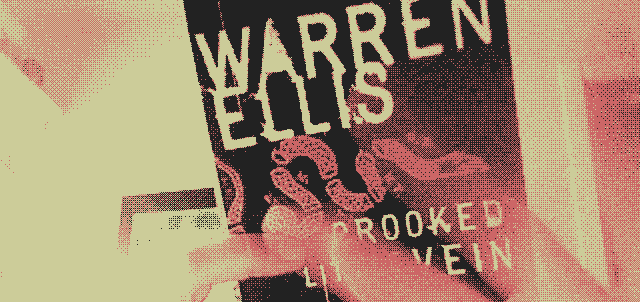Ever since I found Warren Ellis‘ Transmetropolitan in the Reykjavik library, I’ve kept an eye on him. I know I’ve linked his blogs often enough, and he’s long ago reached critical mass when it comes to finding odd things online – I don’t think he has to do any lifting these days, but rather have all the disciples of Whitechapel scouring the web for wrong.
My copies of Transmet were bartered for food a couple of years ago, but I still hit his blog a couple of times a week and follow him on Twitter. The persona he’s built around himself is charming — an alcoholic misanthrope with a heart of gold and a twinkle in his glass eye — and he’s a very prolific writer and blogger and whatnots.


I’ve had it in my mind to buy his novel Crooked little vein since I heard of it. Plodding around Stockholm I found it as a small paperback, and bought it along two other exculpations for illegal downloading. Took less than a day to get through the 260 pages, including the recipe for roasted garlic at the end.
I know exactly who I will give this book to now that I’m done reading it; Someone who hasn’t trolled Ellis webpages for the past couple of years. Because it reads like a very long and rambling blog post, or a bunch of 3AM tweets; The story and the characters are cardboard cutouts on which to hang bizarre phenomena and amusing word combinations. It reads like a Spider Jerusalem rant, and those were fine because they didn’t stretch longer than a spread and ended on a full page panel of someone shitting themselves, which is always good for closure.
Some of the scenes are well written, but they are few. The saline injection bit is one of only two moments where the narrator actually feels present in the moment. The rest is scenery and posturing. There’s never a feeling that anything really matters. I don’t mean this in the bleak oh, nothing matters everything is gray let’s cut ourselves way, but rather that nothing that happens in the novel has any real consequences. There’s one sympathetic character who actually seems to have an internal struggle going on, but Bob Ajax doesn’t show up for more than a couple of pages and is then dispatched by alcohol and cops.


There’s one central idea that I take away with me after reading, and that is how the concept of “mainstream” has changed. It’s how I understand the long tail discussion, but from a cultural point of view rather than an economic: If you bundle together all the disparate “minority views” on any issue, being in a minority then becomes commonplace. It’s the otherness that we have in common, not the quality that make us other. This is a concept that is worth repeating. It’s something that those of us steeped in the postmodern vat might take for granted but that a large number of humanity would shit upon.
The argument for a shifting mainstream is presented nicely enough, although it’s barely made before the novel ends on a romantic note with an action/noir finale. Most of this book reads like a parallel universe story – as if the main character is hallucinating all the time. Actually, imagining that the story is an illusion, that the Mick McGill is merely a fictional character in a deranged storytellers mind, makes it more readable. It would explain the non sequiturs and manic view of the world. Read it as a alt.usenet version of the movie Identity, and you’ll have more fun.
So. This book will be presented to someone who doesn’t know what Bukkakke is. In this day and age it might seem hard to find such people, but I know a few and they will receive a gift.